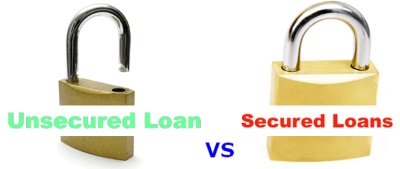Unsecured and Secured personal loans are different beasts and knowing the difference between them is very important before making any application. Lenders especially banks are usually more willing to offer clients loans that are asset backed especially if the amount involved is huge. Secured loans which use property as collateral are usually the cheapest option for homeowners who are looking to borrow a large amount. However unlike unsecured personal loans, you risk losing your property if you do not make payments promptly on a secured loan. This article explains the main differences between the two types of personal loans and looks at both the advantages and disadvantages of both.

Secured Loan
As mentioned earlier, secured personal loans are those types of loans that are protected by collateral or an asset of some sort. The item bought such as a car or a home can also be used as security and a lien is placed on the item. The bank or the finance company will keep the title or the deed until you pay the loan in full, including all the applicable fees and interest. Other items like bonds, stocks and personal property can also be put up as security for this type of loan.
Secured personal loans are often the best way to obtain huge sums of money. Most lenders are less likely to loan a huge amount without an assurance that the money will be paid back in full. Putting a property like a home as security or any other asset is a fairly secure guarantee that a borrower will do everything possible within his or her powers to service the loan promptly. Nevertheless secured personal loans are not just for purchases.
Secured personal loans can also be home equity pr equity loans lines of credit. Such types of loans depend on the amount of home equity, which is the current value of your property less the amount that you still owe. Your property is used as security and if you fail to make timely payments you could lose your home. Secured personal loans often have lower rates, longer repayment terms and higher borrowing limits than unsecured personal loans.
Bottom line: A secured loan simply means you are providing collateral that the loans will be paid back according to the set terms and conditions. It is very important to note that if you fail to repay this type of loan promptly as agreed, the lender or the bank has the right to posses the security you pledged and is allowed to sell it to pay back the loan you took.
Examples of Secured Loans:
- Mortgage
- Boat loan
- Recreational Vehicle loan
- Auto loan
- Home equity line of credit
Advantages and disadvantages of secured personal loans
- Secured personal loans are usually available in huge amounts than unsecured personal loans which generally go up to $30000.
- For those who have a credit history that is not perfect, you may find yourself with limited options when it comes to unsecured loans hence a secured loan will be the best option. Because your property acts as collateral, they can be a bit easier to make the grade.
- Secured loans have much longer repayment periods than unsecured loans. Which in turn reduces the amount a borrower pays monthly significantly. This makes it easy to manage your repayment. It is essential because failing to make monthly payments on such type of a loan may result in loss of your property.
- Most secured loans usually have penalties and offers for early repayments. So to avoid paying over the odds, it is important to carefully check conditions and terms for fees and charges.
Unsecured Personal Loans
Unsecured Personal loans on the other hand are the exact opposite of secured personal loans and include things like, education loans, wedding loans, credit card purchases and personal signature loans. Banks take more of a risk by giving out such loans with no asset or property to recover in-case a borrower defaults, which is the main reason why their interests rates a significantly higher.
For those who do not qualify for unsecured credit, they may still qualify to obtain secured loans as long as they have something valuable to use as security for the loan. When somebody applies for a loan that is unsecured, the bank or other lenders believe that you can pay back the amount borrowed depending on your financial resources. Lenders will judge you based on the main 5 C’s of credit, capacity, capital, character, conditions and collateral. The five are criteria used to benchmark your creditworthiness. Collateral, capital, capacity and character refer to your ability and willingness to repay the loan. Other conditions include your situation plus general economic factors.
Examples of Unsecured Loans include:
- Credit Cards
- Personal (Signature) Loans
- Personal Lines of Credit
- Student loans
- Home Improvement Loans
Advantages and Disadvantages of Unsecured Personal Loans
- Unsecured personal loans are an easy and cheap way for borrowers with a perfect credit history to get their hands on the cash that they need.
- They are also flexible on how long a borrower will repay them, with most making fixed payments between 12 and 60 months.
- Some secured personal loans offer the option of a repayment holiday about 2 to 6 months at the start of the agreement.
- Nevertheless the best loan rates are usually for borrowers who make repayments for over 36 and 60 months, meaning if you choose a shorter time you will pay a higher interest rate.
- The interest charges on smaller and higher amounts of loans can also prove to be a bit more expensive and great offers are often only open to those borrowers with excellent credit scores.
Bottom line: Which type of personal loan is good for me?
Regardless of the type of personal loan you eventually decide to take, remember to do an extensive research about the two types of loans. Do due diligence and check around different banks or lenders plus their terms and conditions. Be sure to shop around big banks, credit unions, peer to peer platforms and local banks before signing that dotted line. You never know who offers the best terms and conditions until you look!



